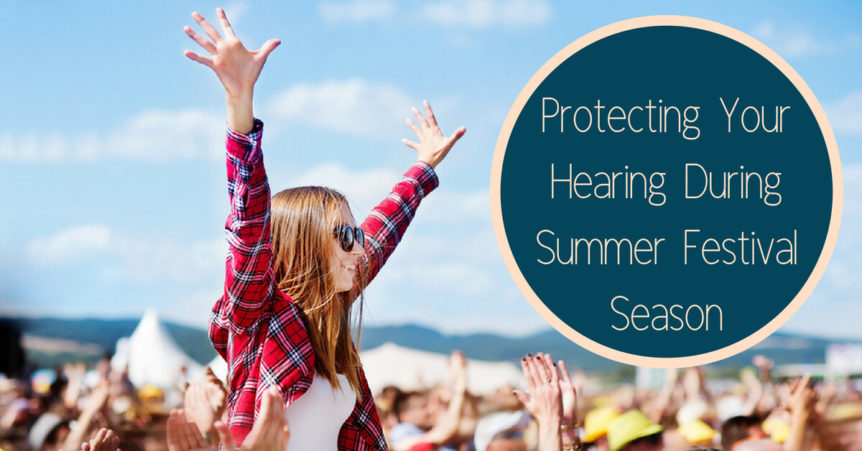Summer’s here and it seems like a weekend doesn’t go by without a music festival. From neighborhood street festivals to international three-stage extravaganzas, festivals draw fans from all over to connect with long days and nights of music and fun. Festivals can be a great time, but they can have a serious impact on your health –especially the way you hear. Blasting music at concert volume can do rapid, permanent damage to your hearing, so if you are planning to attend festivals this summer, be smart and protect your ears.
It Shouldn’t Ring A Bell
Too many concert and festival goers leave a venue with ringing ears. This is called tinnitus, and it’s a signal that you’ve damaged your hearing by listening too long to dangerously loud volumes. Sometimes tinnitus will subside with time, but most hearing damage is permanent, often the loss of hair cells in your inner ear.
Tinnitus can be frustrating and intrusive when it persists, making it hard to concentrate and focus. Protecting and respecting your hearing in noisy situations is a good way to lessen the likelihood you’ll have to face tinnitus issues. While there are therapies to lessen the impact of tinnitus, there is no known cure for the condition. When tinnitus is present, it is a signal that it is time for a hearing exam to assess whether you are experiencing other hearing problems.
Take a Step Back
Being in the front row to see your favorite performers can make even the largest concert seem up close and personal, but it’s not the best plan for hearing health. At festivals, never position yourself in the direct path of speakers and amps. Instead, take a step back from the loudest sound sources.
The good news is most festival performers know how to put on a compelling show no matter where you are in the audience. Some special effects and choreography may even look much better from a distance.
What’s the right distance from the stage? A handy way to figure it out is by installing a decibel monitoring app on your smart phone. A decibel monitor can give you a quick look at the type of noise you are being exposed to. Remember, listening at volumes around 100 decibels cause permanent hearing damage in under 15 minutes.
Don’t Go “Unplugged”
While it is terrific for your hearing if the performers are going acoustic, you should never try attending a festival “unplugged” –always have a pair of ear plugs handy to protect your hearing. Attending a festival often means entire days and nights of exposure to loud music and crowds.
A simple pair of disposable ear plugs will offer you basic protection from excessive noise, but if you take music and festivals seriously, you will want to invest in better hearing protection that can let you rest easy that your passion for great music isn’t going to leave you with permanent hearing loss.
Rest Your Hearing
Your instinct may be to ramp up to a festival by listening to all the bands you plan on seeing, but when considering your hearing health it’s a better plan to build anticipation by giving your ears a rest period before and after attending a festival. Try to have one or two days of quiet buffering any festival going you do.
Even when you are in the thick of it, your hearing is going to need breaks to avoid damage. Concerts often register in the range of 90-105 decibels, a volume that is only suitable for short spurts of listening. Instead of constantly exposing your ears to harmful levels of sound.
Even if you do listen to music in the lead-up to a festival, avoid listening through ear buds and headphones. When sound is delivered directly to the ear canal, it is far more likely to cause inner ear damage and it’s much harder to listen at a healthy volume.
Neighborhood Hearing Aid Center
Whether or not your summer calendar is filled up with festivals, you always want lifelong healthy hearing. Neighborhood Hearing Aid Center can help make that a reality. We offer complete hearing care, from testing your hearing for issue to finding the right solution for every hearing situation. If you’ve noticed recent changes to the way you hear, give us a call and get started on better hearing health today.

